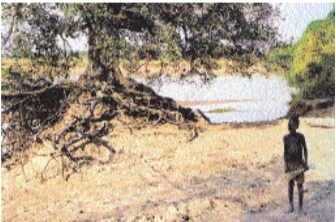In the last installment of “It Was Just Boys Walking,” we found the author and Dominic Arou, a Sudanese refugee now living in Atlanta, on their way from Kenya to southern Sudan. Dominic was attempting to make it back to Marial Bai, the village of his birth, to find and visit with his family, whom he hadn’t seen since fleeing in 1987, at about the age of eight. This month we begin from the beginning, when Dominic Arou left home during the civil war which has engulfed Sudan since 1983, killing about two million people and displacing four million. Though there are many tribal and regional conflicts in the country, at its core the war has pitted the government of Sudan, based in the northern city of Khartoum and controlled for the majority of the past two decades by Islamic fundamentalists, against the black Christians in the southern part of the country. The south, generally supportive of the efforts of the Sudanese People’s Liberation Army (SPLA), has been seeking secession from the north, and the establishment of their own nation, and the equitable division of the oil wealth which has been found under southern Sudanese soil.
Dominic is one of the young refugees known as the Lost Boys, about 4,000 of whom now live in the United States. They were driven from their families during the war, and together thousands of them walked to Ethiopia. Hundreds, if not thousands, died along the way. Below is Dominic’s own account of the first months of his journey, after he and other children from his village fled to avoid murder or capture at the hands of the murahaleen, Arab militiamen in service to the Islamic government. Dominic and his companions began walking across the dry terrain in hopes of reaching Ethiopia, where they expected to find asylum.
This installment is told in Dominic’s words, and reflects his style of English, which he learned during his eight years in a refugee camp in Kakuma, Kenya. Dominic speaks softly, but passionately, frequently punctuating his speech with exclamations. Though his account of harrowing circumstances, of starvation and death, is so matter-of-fact it seems somehow past feeling, Dominic’s outlook is filled with wonder and optimism—anything but fatalistic. Dominic, and the Dinka people generally, are devout Christians, and they see the trials of their past and those before them as preordained by God and imbued with purpose. The story that follows is a result of dozens of hours of interviews and has been edited by the author.
*
“At first, I did not know where we were going. I’d never heard about the name ‘Ethiopia.’ I had never had a journey like that before. But I...
You have reached your article limit
Sign up for a digital subscription and continue reading all new issues, plus our entire archives, for just $1.50/month.
Already a subscriber? Sign in





